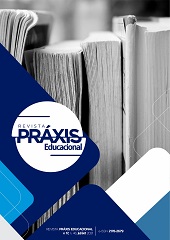The insert of the terminology “right to learning” in the legal framework of teacher training
DOI:
https://doi.org/10.22481/praxisedu.v17i46.8921Keywords:
Teacher Education, National Curriculum Guidelines, Right to LearningAbstract
It is assumed that the National Curriculum Guidelines for Initial Teacher Training for Basic Education and the annex called Common National Base for Initial Basic Education Teacher Training (BNC-Training) support an economicist approach in in line with the current ultraliberal project. It is argued that Opinion CNE/CP No. 22/2019 and respective Resolution CNE/CP No. 02/2019 and CNE/CP Opinion No. 14/2020 and CNE/CP Resolution No. 1/2020 recover a teacher training project anchored in technical rationality, politically and institutionally defeated in the early 2000s. supports and which elements characterize the teacher training project inscribed in the 'new' guidelines. It resorts to documentary research, focusing particularly on the analysis of the insertion of the terminology "right to learning" in the new guidelines with a view to revealing the implications for the initial training of teachers. The aim is, therefore, to trace the path that led to the incorporation of the term “learning right” in the regulations pertaining to teacher education. It adopts the concept of learning and has Biesta (2012, 2013, 2017) as a reference author to analyze the legal discourse. The replacement in the normative text of the language of education by the language of learning is materialized in the BNC-FI and BNC-FC with the listing of skills and abilities, obliterating the place of knowledge in the teacher education project and, therefore, in training of students in basic education, indicating the influence of a matrix based on technical rationality in training processes to the detriment of a foundation based on critical rationality.
Downloads
Metrics
References
BRASIL. Ministério da Educação. Conselho Nacional de Educação/Conselho Pleno. Parecer CNE/CP no 22/2019.Diretrizes Curriculares Nacionais para a Formação Inicial de Professores para a Educação Básica e Base Nacional Comum para a Formação Inicial de Professores da Educação Básica (BNC-Formação). Aprovado em: 7/11/2019. Parecer Homologado - Portaria n° 2.167, publicada no D.O.U. de 20/12/2019, Seção 1, p. 142.
BRASIL. Ministério da Educação. Conselho Nacional de Educação/Conselho Pleno. Resolução CNE/CP no 2, de 20 de dezembro de 2019. Define as Diretrizes Curriculares Nacionais para a Formação Inicial de Professores para a Educação Básica e institui a Base Nacional Comum para a Formação Inicial de Professores da Educação Básica (BNC- Formação).
BRASIL. Ministério da Educação. Conselho Nacional de Educação/Conselho Pleno. Parecer CNE/CP no 14/2020. Diretrizes Curriculares Nacionais para a Formação Continuada de Professores da Educação Básica e Base Nacional Comum para a Formação Continuada de Professores da Educação Básica (BNC-Formação Continuada). Aprovado em: 10/7/2020. Parecer Homologado - Portaria n° 882, publicada no D.O.U. de 26/10/2020, Seção 1, p. 57.
BRASIL. Ministério da Educação. Conselho Nacional de Educação/Conselho Pleno. Resolução CNE/CP no 1, de 27 de outubro de 2020. Dispõe sobre as Diretrizes Curriculares Nacionais para a Formação Continuada de Professores da Educação Básica e institui a Base Nacional Comum para a Formação Continuada de Professores da Educação Básica (BNC- Formação Continuada).
Downloads
Published
How to Cite
Issue
Section
License

This work is licensed under a Creative Commons Attribution-ShareAlike 4.0 International License.
You are free to:
Share - copy and redistribute the material in any medium or format; Adapt - remix, transform, and build from the material for any purpose, even commercially. This license is acceptable for Free Cultural Works. The licensor cannot revoke these freedoms as long as you follow the terms of the license.
Under the following terms:
Attribution - You must appropriately give credit, provide a link to the license, and indicate if any changes have been made. You may do so in any reasonable way, but not in a way that suggests that you or your use is endorsed by the licensor.
There are no additional restrictions - You cannot apply legal terms or technological measures that legally restrict others to make any use permitted by the license.










